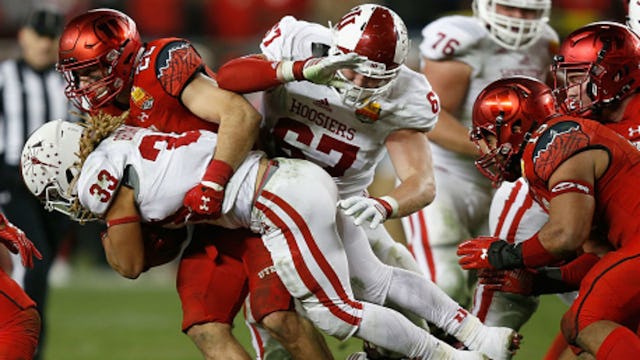Indiana University Won't Accept Student-Athletes With A History Of Sexual Violence

Indiana University’s new policy bans the admission of any student-athlete with a history of sexual violence
Indiana University took a huge first step in combating sexual assault and violence against women with a new policy it enacted Wednesday.
The new policy bans any prospective student with a history of sexual assault or domestic violence offenses from joining any of the school’s athletic programs.
According to the guidelines, “Any prospective student-athlete — whether a transfer student, incoming freshman, or other status — who has been convicted of or pled guilty or no contest to a felony involving sexual violence, or has been found responsible for sexual violence by a formal institutional disciplinary action at any previous collegiate or secondary school … shall not be eligible for athletically-related financial aid, practice or competition at Indiana University.”
As a quick note, “sexual violence” in the provisions above is an umbrella term for “dating violence, domestic violence, rape, sexual assault, or sexual violence” as defined by the Indiana University Policy on Sexual Misconduct.
“I think this will be an important policy to help protect members of the Indiana University community,” IU Athletic Director Fred Glass told the IndyStar.
Indiana University is the not the first school to enact such provisions. In 2015, the Southeastern Conference (SEC), which includes 14 colleges, enacted a similar ban which doesn’t allow any school in the conference to accept transfer students with a history of “serious misconduct,” (i.e domestic or sexual violence of any sort) according to ESPN. Glass said he was inspired by the tougher rules set forth by the SEC. “It’s something the SEC, with their transfer ban, I think raised the issue generally.” He continued, “We’ve been working on that since that time, in trying to put something together that makes sense for Indiana University.”
Indiana University is part of the Big Ten conference, which includes 13 others schools such as Rutgers and Penn State.
“I think it’s new ground,” Glass said. “My hope is that we’re leading in this area, and maybe others will follow with, maybe not the exact same policy, but one that fits their particular institutions.”
While we don’t want to be a downer about these tougher rules, it is indeed sad that it’s considered “new ground.” We won’t mince words; these rules are way overdue. The fact that it took this long to get something to protect students in place is everything that’s wrong with how we deal with and talk about sexual violence in this country. The numbers paint a pretty stark picture when it comes to sexual violence on campuses and even more troubling are the statistics involving athletes.
Laura Finley, an assistant professor of sociology and criminology at Barry University, told Wisconsin Public Radio (WPR) in 2014, that it’s hard to gather exact incidences of sexual violence (many are not reported), but the findings indicate one-third of sexual assaults on campuses are perpetrated by athletes. Given that information, it’s shocking that schools haven’t done something sooner in the form of tougher rules. Still, we have to start somewhere and the moves by Indiana University and the SEC are a good first step. We hope other schools act swiftly and follow suit.
So, how will the school carry out their new policy? According to the provisions, staff members in the athletics program are required to do their “due diligence” by running background checks and internet searches on prospective athletes. Coaches are encouraged to speak with previous teachers, administrators and coaches as well. Additionally, the students will be asked about “any previous or potential arrests, convictions, protective orders, probations, suspensions, expulsions, or other discipline involving sexual violence or any other matter.”
As parents who may one day send our kids to these universities it’s our job to hold them accountable too. Teaching our kids about consent and making sure the schools they attend have protective measures in place is a start. Our children deserve to learn in safe environments and it’s our responsibility to demand it. It’s the school’s job to listen and take action.